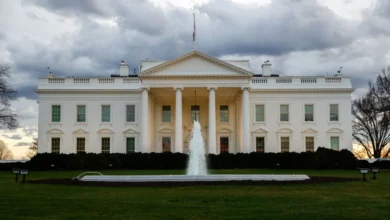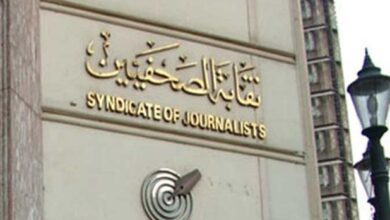A number of columnists in privately-owned newspapers such as Al-Watan, Youm7 and Al-Tahrir published blank opinion articles on Thursday to protest the appointment of new editors-in-chief for 45 state-run newspapers by the Shura Councilthe day before.
The editors were nominated by committee within the council, and approved in a vote during a general session of the upper house of Parliament, which is dominated by the Muslim Brotherhood’s Freedom and Justice Party.
The protesting writers said that the appointments were made with far from professional standards and marked the first nail in the coffin of the freedom of the press under the Muslim Brotherhood. They accused the FJP of adopting the same policies of former President Hosni Mubarak who made national newspapers a mouthpiece for his policies.
"This is a clear attempt to 'Brotherhoodize' the national press. Even if the names do not belong to the Muslim Brotherhood, their previous writings gave an impression that they were ready to defend the Brotherhood against critics and to defend the policies of President Mohamed Morsy all along," said Gamal Fahmy, a member of the Journalists Syndicate board and one of those who left their column blank in Al-Tahrir daily on Thursday.
But, leaders of the Muslim Brotherhood said they had the legitimacy to appoint new editors since they controlled a majority of the seats in the Shura Council. The movement’s leaders said the attack on appointments comes within the framework of an organized smear campaign to tarnish the image of the Muslim Brotherhood, adding that the choices of the Shura Council were based on merit.
The Shura Council formed a committee two months ago to select new editors-in-chief for 55 state-run publications belonging to eight national press institutions owned by the Supreme Press Council. The council is associated with the Shura Council according to a legislative amendment passed in 1979, an association preserved in the Constitutional Declaration of March 2011. The legislation tightened the ruling National Democratic Party's grip over the state press as fraudulent parliamentary elections guaranteed the now-dissolved party the majority of the seats.
The committee received 234 nominations over the past month and a half, of which 45 journalists were selected for editors-in-chief of state-run newspapers including Al-Ahram, Al-Akhbar and Al-Gomhurriya and the official Middle East News Agency.
Ten editors of national editions kept their positions. Editors at the French edition of Al-Ahram, Al-Ahram Hebdo, and also Al-Bait, a housing magazine affiliated with Al-Ahram.
A problematic selection
The selection committee, formed by FJP leader and speaker of the Shura Council Ahmed Fahmy, who is also the chairman of the Supreme Press Council, has approved a number of criteria for the selection of editors. The criteria included that the nominee should have at least 10 uninterrupted years of experience at a newspaper, should not have relations with Israel, and should not have engaged in activities creating conflict of interests, such as mediating for the sale of ads or consulting governmental agencies on media issues.
The committee, which was composed of 14 members, was led by FJP member Fathy Shehab, the head of the Shura Council’s information and culture committee. It included four other Shura Council members, three of them from the FJP and one from the Nasserist Karama Party. It also included two mass communication professors and seven members of the Journalists Syndicate and prominent journalists.
Magdy al-Maasarawy, a member of the Shura Council for Karama Party, said the standards were different from those agreed upon in the earlier sessions of the committee. He resigned from the committee at the end of last month
The standards approved in the meeting were more professional than the final criteria approved by Shehab's committee, he said.
"Even the standards approved by Shehab's committee have not been applied. I have an official letter, for instance, from Al-Ahram that the new editor-in-chief of Al-Ahram daily, Abdel Nasser Salama has not worked 10 years uninterruptedly. He has been working sporadically for Al-Ahram since he entered the institution in 1985. He started to work there consistently in 2006, [when] he continued to serve as Al-Ahram correspondent in the capital of Oman, Muscat, until he returned to Cairo in 2009 and then continued to write opinion articles. That makes no more than six years," Maasarawy said.
Maasarawy added that 11 applicants worked as media advisers for some companies that belonged to the Ministry of Industry and they were approved as possible nominees by the committee, he added.
FJP Shura Council member Sediq Abdel Maqsoud, meanwhile, stressed that the standards set by the committee were merely professional and not political.
“Shehab has announced the results according to the total marks each nominee obtained from all committee members. The vote counting process was completely transparent,” Abdel Maqsoud said.
But Maasarawy, who said he resigned from the committee once he was finished with the assessment of the nominees, not knowing whether his comments were considered, questioned the transparency of the process.
“A few days before the announcement of the appointees, I heard they were submitted to the Shura Council speaker, head of the FJP parliamentary bloc and head of the Nour Party’s parliamentary bloc before final approval. Where is the transparency they are talking about?” he wondered.
Legal hurdles
Many judicial conflicts took place around the fate of the committee. The administrative court rejected on 11 July a lawsuit filed by former candidate for the leadership of the Journalists Syndicate Yahya Qalash demanding to stop the work of the committee. The Supreme Administrative Court as a higher authority set 22 September to decide on the case.
“The Shura Council is not concerned by the court ruling,” Shehab told the private daily Al-Badil. “The journalists want change and they will not respond to the desires of a small segment that wants to keep the institutions as they are.”
In response, Gamal Fahmy said: “This is intellectual terrorism. The FJP won a majority in the Shura Council with the votes of only 7 percent of eligible voters whose total was approximately 50 million. This is only a fake majority.”
On 7 July, the Supreme Administrative Court referred the Shura Council elections law to the Supreme Administrative Court to rule on its constitutionality. The Shura Council is therefore threatened with the same fate as the People’s Assembly, which was dissolved after the Supreme Constitutional Court ruled it unconstitutional on 14 June. The court said some of the articles in the People’s Assembly elections law were invalid, and the same law was used for the Shura Council elections.
But legal experts say that even a supreme court ruling that dissolves the Shura Council would not affect its decisions, in the same way the legislation issued by the dissolved People’s Assembly remained despite the dissolution of the assembly. Therefore, they conclude that the appointments of chief editors will not be affected by a ruling that dissolves the Shura Council.
The three main new chiefs
Abdel Nasser Salama, chief editor of Al-Ahram
Abdel Nasser Salama succeeds Abdel Hady Allam, who was appointed in February 2012 after Abdel Azim Hammad, was forced to resign from his position by protests from the paper’s editors.
Salama began working for Al-Ahram in the mid-1980s. He worked in several departments but his work at Al-Ahram was interrupted by work for other newspapers in the Gulf during the 1990s. Salama then returned to Al-Ahram in 2006, becoming the bureau chief in Muscat before returning to Egypt, to write a column titled Salamat in 2009.
Salama angered Copts in 2010 when he criticized the late Pope Shenouda III in his column. Salama held Shenouda accountable for inciting sectarian hatred between Muslims and Christians for the last four decades.
Salama began wooing Morsy when the latter chose Saudi Arabia to be his first foreign destination in mid-July. He hailed Morsy’s choice as a sound one and criticized revolutionary forces and the political elite, who he said hurt relations between Egypt and Saudi Arabia after they staged protests strongly criticizing King Abdullah.
In his first statement after the appointment, Salama told the privately owned paper Al-Watan that the Shura Council chose chief editors transparently. He added that all those who oppose the decisions of the Shura Council should be ashamed of themselves and remember the time when the dissolved state security apparatus used to appoint chief editors.
On his first day in the position, Salama canceled a page where the paper traced progress of Morsy’s 100-day plan, where he vowed to restore security, among other things in the country.
Mohamed Hassan al-Banna, chief editor of Al-Akhbar
Banna succeeds Yasser Rizq, one of the chief editors was a strong critic of the Brotherhood. Brotherhood leader Khairat al-Shater sued Rizq and the paper in April when it quoted Shater as saying that if a figure from the regime of Mubarak won in the presidential election then the Brotherhood would resort to violence. Shater said he never gave such statements.
Banna worked as managing editor of Al-Akhbar before he was appointed chief editor. He obtained a master’s degree in journalism from the Sadat Academy for Administrative Sciences in 2010. Throughout his position, Banna has been more concerned with employees’ benefits and support network inside the institution. He worked as the chair of the employees fund and the head of the committee supervising the treatment of pensioners.
Gamal Abdel Rahim, chief editor of Al-Gomhurriya
Abdel Rahim began his career at Al-Gomhurriya in 1988 as a legal reporter, and then covered incidents related to terrorism and espionage in the 1990s. He was then elected as a member of the management board at the publishing house affiliated with the paper from 2005 through January 2010.
He was elected as a member of the Journalists Syndicate board, where he served from November 2007 through October 2011, when he was reelected to the board.
Abdel Rahim was accused in 2009 of inciting arson after he allegedly encouraged Muslims to set fire to the homes of members of the Baha’i religious minority in the village of Sharonya, Sohag.




